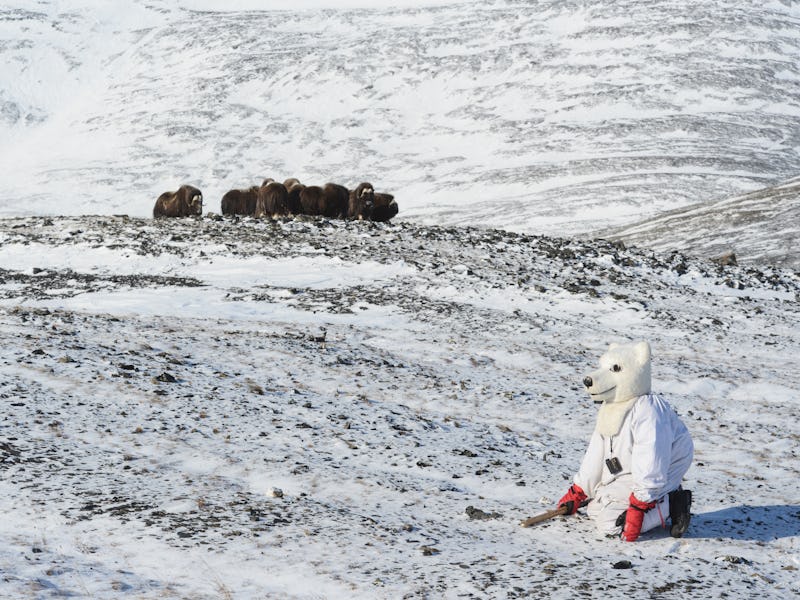This Scientist Donned a Polar Bear Suit to Chase Muskoxen Around the Arctic
The muskox is a strange beast. The guy studying them is stranger.

Joel Berger wanted to find out how muskoxen would react when polar bears are close by — a result of an increasingly warming climate. So he did the natural thing: He put on a polar bear suit and went looking for muskoxen.
Berger headed to Russia’s Wrangel Island for his research, which might be considered eccentric behavior on the level of Grizzly Man, but it was all in the name of science.
A longtime conservation biologist with the Wildlife Conservation Society and Colorado State University, he planned this trip to the High Arctic to research how muskoxen might respond to a rapidly changing environment.
Polar bears are having a harder time finding their favorite snack — seal meat — as Arctic sea ice disappears. The bears will be hunting more and more on dry land in the future, and they’ve already been known to kill the occasional muskox.
Berger first needed a control group, so he put on a caribou suit and recorded how the muskoxen reacted to it. On a separate trip, he put on a polar bear suit and recorded how animals reacted.
So, can muskoxen tell the difference between a biologist in a bear suit and an actual predator? The science is still out, though the animals clearly react as if the costumed scientist is a real threat.
Watch them take off as he approaches:
The muskox is a strange and magnificent beast. It looks a bit like a giant long-haired Guinea pig, with J-shaped horns that fall down like hair before curling out on either side of its skull. A full grown adult typically weighs about 650 pounds. Arctic wolves are its primary predator, targeting mostly the young and injured. Grizzly and polar bears have been documented to take the occasional muskox as prey, too.
Two muskoxen flee as Joel Berger approaches.
Muskoxen defend themselves by huddling in a tight-packed circle, protecting the most vulnerable within the center. Males may occasionally break ranks to charge the threatening animal. Whether Berger successfully convinced the herd that he was a polar bear, he did manage to freak them out enough to witness this behavior first hand.
This isn’t the first time Berger’s unconventional methods have attracted attention. He was once kicked out of Namibia for his conservation work on black rhinos. Berger’s research challenged the government’s program of cutting off rhino horns as a way of discouraging poaching. He found that while poachers may be less interested, hornless rhinos were unable to effectively protect their young from predators.
Good science demands a control -- in this case, a caribou costume.
Berger was a finalist for the prestigious Indianapolis Prize for animal conservation in 2014 and in 2016.